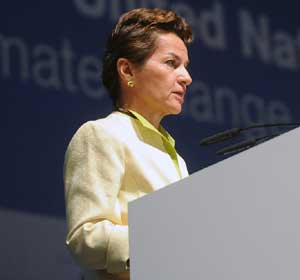Unmistakable Link Between Security Concerns
And Climate Change States UNFCCC Head
By Marianne de Nazareth
21 February, 2011
Countercurrents.org
 In a clearly enunciated address made by Christiana Figueres, Executive Secretary United Nations Framework Convention on Climate Change (UNFCCC) to the Congress of Deputies of Spain at the Centro Superior de Estudios de la Defensa Nacional in Madrid, on Tuesday, she warned the world about the “Link between security concerns and Climate Change.”
In a clearly enunciated address made by Christiana Figueres, Executive Secretary United Nations Framework Convention on Climate Change (UNFCCC) to the Congress of Deputies of Spain at the Centro Superior de Estudios de la Defensa Nacional in Madrid, on Tuesday, she warned the world about the “Link between security concerns and Climate Change.”
“All nations need stability to flourish,” she said, “ In its context, it is alarming to admit that if the community of nations is unable to fully stabilize climate change, it will threaten where we can live, where and how we grow food and where we can find water. In other words, it will threaten the basic foundation – the very stability on which humanity has built its existence.”
The factors that can contirbute to this alarm are reduced fresh water supplies, climate changing weather patterns which cause a decrease in agricultural output, rise in sea levels and increase in severe natural disasters which cause human migration, all of which could all lead to world instability and food insecurity. This would give rise to conflict situations increasing as govenrnments will deploy all means in their power to meet the basic needs of their populations.
“What will be better?” asked Ms Figueres, “ To continue to support a traditional global military budget that has risen 50 percent in real terms from 2000 to 2009 and continues to increase? Or to increase a preventive military budget investing into adaptation and low-carbon growth and avoid the climate chaos that would demand a defence response that makes even today’s spending burden look light?”
Obviously in the interest of the planet and humankind, Figueres likened the efforts that needed to be made by the world to two keys, which should be stuck into the area of change and turned. One key she called adaptation and the other key being mitigation. With adapting to the impacts of climate, people learn how to cope in a changing world, and ultimately contribute to preventing conflict, she said.
The second key she mentioned was mitigation, which is simply the reduction of greenhouse gases which is critical to limit the severity of climate change and its potential to cause conflict in the long-term. The more greenhouse gases are reduced, the more climate change impacts will be limited, and with less climate change there is naturally less conflict.
“ The recent UN Climate Change Conference in Cancun, put in place a solid framework for the adaptation and mitigation keys to be turned and for them to be turned on an increasing scale going forward. In terms of adaptation, the conference established the Cancun Adaptation Framework, which will strengthen action on adaptation in
developing countries through international cooperation. The conference also established an Adaptation Committee to promote the implementation of stronger action on adaptation through providing technical support and guidance to countries,” said Figueres.
In terms of mitigation, she said, governments have recognised a 2C temperature limit, with a possibility of a 1.5C limit. Importantly, the conference also officialised the mitigation targets of industrialised countries which had been put forward during 2010. Industrialised countries also committed to develop low-carbon development plans. Additionally, 37 developing countries made official their national mitigation measures that aimed to significantly change emission levels for 2020.
Figueres also said that Cancun brought forward a policy of global low carbon economic growth with a primary focus on low carbon and preferably clean energy. So to make this plan work, she said the whole world needed to work together as one and the planet required a new, and sustainable model of development based on peace and not war to achieve its goals. This is the time she said when governments should use their resources along with these two keys of mitigation and adaptation towards responding to climate change threats in a positive manner raqther than resort to conflict.
She ended her address by succinctly saying in Spanish, “ Por mucho que la paz cueste nunca es cara ( As much as peace may cost, it is never too expensive)” And she urged the worlds governments to work towards this peaceful co-operation rather than take the wasteful road of war and conflict.
(The writer is a media fellow with the UNFCCC, freelance journalist and adjunct faculty in St. Joseph’s PG College and COMMITS)
Comments are not moderated. Please be responsible and civil in your postings and stay within the topic discussed in the article too. If you find inappropriate comments, just Flag (Report) them and they will move into moderation que.


